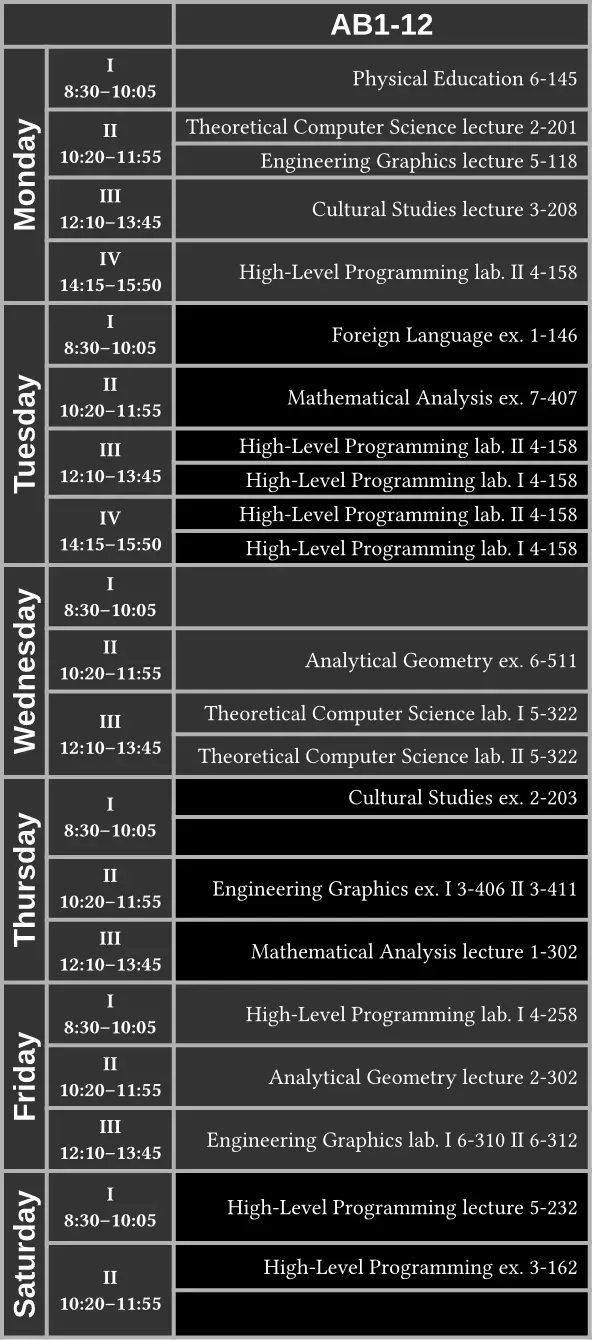neat-timetable is a template for creating timetable for university classes (class schedule) that use a 2-week system: numerator and denominator week. Essentially, the first week is a numerator week, therefore the second week is a denominator week, and then the cycle continues.
Usage
First, choose the “neat-timetable” template in https://typst.app or via CLI:
typst init @preview/neat-timetable:0.1.0
To use the default settings, you will need the Liberation typeface.
Particularly the LiberationSans-Bold.ttf file.
You can also start using the template by directly importing it:
#import "@preview/neat-timetable:0.1.0": template, timetable
#show: template.with(group: "D1-21")
#pdf.embed("timetable.typ") // Make PDF reproducible and easy to edit.
#timetable(data: (
"Monday": (
("PE 153",),
(
"Theoretical Computer Science lecture 201",
"Engineering Graphics lecture 118",
),
("Cultural Studies lecture 3-208",),
),
"Tuesday": (
("Foreign Language ex. 146",),
("Mathematical Analysis ex. 307",),
(
"High-Level Programming lab. II 158",
"High-Level Programming lab. I 158",
),
),
"Thursday": (
("Cultural Studies ex. 203", none),
("Mathematical Analysis lecture 1-302",),
),
"Friday": (
("Analytical Geometry lecture 302",),
("Analytical Geometry ex. 111",),
),
))

Besides class name and location, you can, for example, include type of class (lecture, exercise, laboratory work, etc.), subgroup (if it exists, when there are many students), and professor name.
Automating data creation
If you have a structured representation of timetable that can be transformed to
Typst dictionary to be used by timetable (e.g., ШУЦ1-31Б.json), you can
automate everything, so that your Typst file only includes:
#import "/template.typ": get-timetable-info, template, timetable
#show: template
#pdf.embed("timetable.typ")
#timetable(..get-timetable-info(json("ШУЦ1-31Б.json")))

See automated-example-ru test.
If you would like to copy the Typst dictionary from the get-timetable-info,
use repr:
#import "@preview/neat-timetable:0.1.0": get-timetable-info
#repr(get-timetable-info(json("ШУЦ1-31Б.json")).at("data")) // Data only
#repr(get-timetable-info(json("ШУЦ1-31Б.json")).at("group")) // Group only
#repr(get-timetable-info(json("ШУЦ1-31Б.json")) // `arguments` value
Then simply select text from the generated PDF, paste it in Typst source file
and use like shown in Usage or Examples. Note that
repr doesn’t have stable/defined output, so in future it might not produce
valid Typst dictionary syntax. Furthermore, you will get a nice representation
only if format-entry outputs str and not content (default implementation
outputs str).
Examples
#import "@preview/neat-timetable:0.1.0": template, timetable
#show: template.with(group: "AB1-12")
#timetable(data: (
"Monday": (
("Physical Education 6-145",),
(
"Theoretical Computer Science lecture 2-201",
"Engineering Graphics lecture 5-118",
),
("Cultural Studies lecture 3-208",),
("High-Level Programming lab. II 4-158",),
),
"Tuesday": (
("Foreign Language ex. 1-146",),
("Mathematical Analysis ex. 7-407",),
(
"High-Level Programming lab. II 4-158",
"High-Level Programming lab. I 4-158",
),
(
"High-Level Programming lab. II 4-158",
"High-Level Programming lab. I 4-158",
),
),
"Wednesday": (
(none,),
("Analytical Geometry ex. 6-511",),
(
"Theoretical Computer Science lab. I 5-322",
"Theoretical Computer Science lab. II 5-322",
),
),
"Thursday": (
("Cultural Studies ex. 2-203", none),
("Engineering Graphics ex. I 3-406 II 3-411",),
("Mathematical Analysis lecture 1-302",),
),
"Friday": (
("High-Level Programming lab. I 4-258",),
("Analytical Geometry lecture 2-302",),
("Engineering Graphics lab. I 6-310 II 6-312",),
),
"Saturday": (
("High-Level Programming lecture 5-232",),
("High-Level Programming ex. 3-162", none),
),
))

#import "@preview/neat-timetable:0.1.0": template, timetable
#show: template.with(group: "AБ1-12")
#timetable(data: (
"Понедельник": (
("Физическая культура 2-123",),
(
"Теоретическая информатика лекц. 5-108",
"Инженерная графика лекц. 1-306",
),
("Культурология лекц. 5-208",),
("Высокоуровневое программирование лаб. II 5-158",),
),
"Вторник": (
("Иностранный язык упр. 1-146",),
("Математический анализ упр. 7-407",),
(
"Высокоуровневое программирование лаб. II 5-158",
"Высокоуровневое программирование лаб. I 5-158",
),
(
"Высокоуровневое программирование лаб. II 5-158",
"Высокоуровневое программирование лаб. I 5-158",
),
),
"Среда": (
(none,),
("Аналитическая геометрия упр. 7-411",),
(
"Теоретическая информатика лаб. I 5-222",
"Теоретическая информатика лаб. II 5-222",
),
),
"Четверг": (
("Культурология упр. 1-203", none),
("Инженерная графика упр. I 1-306 II 1-311",),
("Математический анализ лекц. 5-202",),
),
"Пятница": (
("Высокоуровневое программирование лаб. I 5-158",),
("Аналитическая геометрия лекц. 5-202",),
("Инженерная графика лаб. I 3-210 II 3-212",),
),
"Суббота": (
("Высокоуровневое программирование лекц. 5-232",),
("Высокоуровневое программирование упр. 5-162", none),
),
))

API
template
/// Template function used together with `timetable`.
///
/// - group (str, content): timetable of this group/class
/// - time-data (array): array of timings for each class to show
/// - text-fill (color): `text.fill`
/// - table-fill (color): `table.fill`
/// - table-zebra-fill (color): alternating `table.fill` for readability
/// - table-zebra-odd (bool): whether to use zebra fill for odd weekdays
/// - table-stroke (stroke): `table.stroke`
/// - title (auto, none, str, content): document title
/// - extra-styling (bool): whether to apply extra styling that can't be
/// undone, because of show rule wrapper
/// - sans-font (str): which sans-serif font to use as a part of `extra-styling`
/// - doc (content): document to apply the template to
#let template(
group: "group name",
time-data: time-data,
text-fill: white,
table-fill: rgb("333"),
table-zebra-fill: black,
table-zebra-odd: false,
table-stroke: 2pt + rgb("b2b2b2"),
title: auto,
extra-styling: true,
sans-font: "Liberation Sans",
doc,
)
timetable
/// A table wrapper for creating class schedule.
///
/// - group (auto, str, content): timetable of this group/class.
/// `auto` uses data from used template, otherwise default is used.
/// - zebra-fill (auto, color): alternating `table.fill` for readability.
/// `auto` uses data from used template, otherwise default is used.
/// - zebra-odd (auto, bool): whether to use zebra fill for odd weekdays.
/// `auto` uses data from used template, otherwise default is used.
/// - time-data (auto, array): array of timings for each class to show.
/// `auto` uses data from used template, otherwise default is used.
/// - data (dictionary): dictionary of weekday as keys and array of classes as
/// values. Each class can be an array of 1 value (class on numerator and
/// denominator week) or 2 values (first class on numerator week, second
/// class on denominator week). Each value can one of: `none`, `str`,
/// `content`.
#let timetable(
group: auto,
zebra-fill: auto,
time-data: auto,
zebra-odd: auto,
data: (:),
)
format-entry
/// Format entry (class info) in the timetable.
///
/// - class (dictionary): source class data that contains everything necessary
/// for formatting an entry
/// -> content
#let format-entry(class)
get-timetable-info
/// Transform source dictionary to `arguments` that can be passed to
/// `timetable`. To modify, simply create your own function from scratch, or
/// copy this one to your project and edit accordingly.
///
/// - source (dictionary): source dictionary. Can be obtained through data
/// loading functions.
/// - format-entry (function): used to format single entry from data. This
/// splits the schedule generation logic from class info generation logic.
/// -> arguments
#let get-timetable-info(source, format-entry: format-entry)
License
This Typst package is licensed under AGPL-3.0-only license with exception for
format-entry and get-timetable-info functions in the template.typ file
that are licensed under MIT-0 license. You can view:
- the AGPL-3.0-only license in the
AGPL-3.0-only.txtfile in theLICENSESdirectory in the root of the project or at https://www.gnu.org/licenses/agpl-3.0.txt - the MIT-0 licenses in the
MIT-0.txtfile in theLICENSESdirectory in the root of the project or at https://romanrm.net/mit-zero

